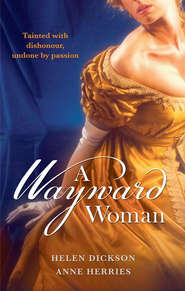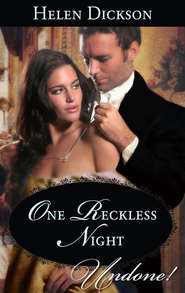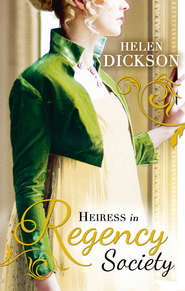По всем вопросам обращайтесь на: info@litportal.ru
(©) 2003-2025.
✖
Seducing Miss Lockwood
Настройки чтения
Размер шрифта
Высота строк
Поля
She had also heard all about maids in many of the big houses having to leave in a hurry when they found themselves in a delicate condition, because they had caught the fancy of the master or one or more of his sons, who thought young domestic girls were there to be used for their personal convenience. It was a way of life with them. For all she knew the Duke of Hawksfield might be no different, in which case she would do her work and avoid him whenever possible.
‘You aren’t, by any chance, one of those women who are committed to women’s rights—equality and all that.’
‘Being a woman, naturally I support it, but I am not involved with any group. Men will continue to make the rules for a good many years, just as they have always done, but one day I do believe women will overcome adversity and have the same freedom as men.’
Dominic was curious. ‘Where do you live? Where are your family?’
‘I live where I work.’
‘And do you have siblings, Miss Lockwood?’
‘I—have a brother—a half-brother.’
‘A half-brother?’ he queried.
‘His mother was my father’s first wife. She died. As did my own mother, Father’s second wife.’
‘And your brother? Where is he?’
She looked down at the open book on the table. ‘We don’t see each other very often,’ she answered truthfully, having decided when she had accepted the position that she would withhold her brother’s temporary embarrassment from him.
Sensing some kind of evasion, Dominic looked at her, but did not pursue the issue. ‘And I understand you were educated at Miss Millington’s Academy in Bath.’
‘Yes.’
He cocked a sleek, inquisitive brow. ‘An expensive academy, Miss Lockwood.’
‘My father was a scholar—a professor. He taught theology and history at Oxford University, where he himself studied. He was an extraordinary man, a very private one, and his interest in books was wide ranging. He believed everyone had a right to an education, and where I was concerned he put that before anything else, which was why he chose to send me to Miss Millington’s Academy.’
She did not tell him that it was only at her father’s funeral two years ago that she learned that all his money was gone. The Academy had been very expensive and he had never let her suspect his financial difficulties. He had continued to pay her tuition and to send money for her clothes. On her visits to his rooms in Oxford he had put on a front and she had never suspected anything was amiss.
The money was gone, and she would have been homeless had Miss Millington not offered her a position to teach at the Academy. Of course there was someone she could have appealed to—her maternal grandfather, but he had disowned her mother when she had eloped with her father, and Juliet had too much pride to go begging to an old man.
‘And you were a teacher at the Academy?’
‘Yes, until I went to work for Sir John Moore—doing very much what I shall be doing here—and I must thank you for considering me suitable for the position. But you already know the work I did for Sir John. I included it in my letter of application, along with my references from both Miss Millington and Sir John.’
‘And glowing references they were, too, which was why I considered you suitable for the position without asking to see you first. You are apparently well read and uncommonly well educated. You speak fluent French and read and speak Latin and Greek, so why shouldn’t I consider you a suitable person to catalogue my books?’
‘Because I am a woman. There are many who think it unnecessary and impudent for females to be tutored beyond the basics of womanly duties.’
‘That doesn’t trouble me. Does it trouble you, Miss Lockwood?’
‘No, not in the slightest, but many men are too prejudiced when it comes to women working for them.’
‘It does not concern me. I am merely interested to know that you can do the job to my satisfaction.’
‘And did you have many applicants to consider, Lord Lansdowne?’ she dared to ask.
‘Just the one. You, Miss Lockwood.’
‘Then there really wasn’t very much to consider, was there?’
‘No.’ He went to the desk and picked up a book she had been looking at. ‘The library here is quite extensive and has been neglected for a good many years. There are many first editions and rare volumes, which I am certain you will find interesting—along with a good selection of novels. There is a great deal of work to do, and the pace will become quite stressful. You may find it tedious, but it is necessary if the books are to be preserved. Cataloguing was undertaken in my grandfather’s time and the library needs updating. More books have been added and some of the volumes are in need of repair. There will be much to do.’ He passed a keen eye over her face. ‘Are you up to such an undertaking, Miss Lockwood?’
‘I would not be here if I didn’t think so. As you pointed out yourself, Lord Lansdowne, I am well qualified.’
Dominic glanced down at the title of the book and opened it, the gold signet ring on his left hand flashed as it caught the light. He smiled. ‘You like Greek mythology?’
‘Yes, very much.’
‘Which you have read extensively?’
‘Of course,’ she admitted.
‘And I was under the impression that reading the classics branded a female a blue stocking.’
‘It usually does, in the circles in which you move, but in my case society is not important to me. I am interested in things beyond petit point and fashion. No doubt you consider this unfeminine.’
‘Not at all—but there isn’t a lady of my acquaintance who thinks of anything other than clothes and meaningless gossip, so it makes a refreshing change to meet a woman who does not.’
‘Well, firstly, I am not a lady, and, secondly, I actually find it tedious.’
‘Do you sing—and play a musical instrument?’
‘No, I’m afraid not. I’m tone deaf.’
Her candid confession brought a smile to his lips. ‘No one’s perfect, Miss Lockwood,’ he cheerfully and magnanimously declared. ‘Besides, it makes a refreshing change. I’ve long desired to meet a female who reads Greek mythology, and I shall not be deterred from employing you merely because you can’t sing or play the piano.’
Despite herself, Juliet found herself smiling. ‘That’s a relief. It will make my work a whole lot easier knowing I shall not be required to break into song.’
‘That will not help my project to get the library sorted.’
‘Does it not please you to listen to ladies entertain, Lord Lansdowne?’
‘No, not particularly. Between you and me, Miss Lockwood, some of them would be as well to keep their mouths closed. Permanently.’ He put the book down and perched his hips against the desk, feeling drawn to her and curiously reluctant to leave and to keep the conversation flowing. ‘I am sure we have many points of interest and I see no reason why we should not become good friends.’
‘I see many reasons,’ Juliet stated primly.
‘And what are they?’
‘Your elevated position, for one thing. You are a duke, well descended, a person with breeding, bloodlines and ancestry. I am your employee, and I have no intention of breaching the social code. You have already seen by my behaviour when I arrived—when I so rudely barged into the room where you were entertaining your friends—that my knowledge of protocol is negligible.’
‘It is easily acquired.’
‘I have no doubt it is, by those in a position to do so, but because of who I am, I do not expect noble etiquette to concern me. I am happy with the present arrangement.’
His eyes narrowed. ‘You are a cool customer, Miss Lockwood.’












